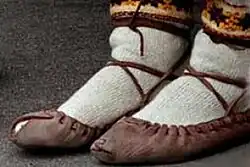pastala
See also: pastalā
Latvian

Pastalas

Pastalas
Etymology
This word, already mentioned in 14th-century texts, is traditionally considered a borrowing from Russian посто́лы (postóly) (dialectal), itself apparently a borrowing from Turkish postal (“shoe”), from post (“skin, leather”). More recently, it has been suggested that it may be derived from the stem of stāt (“to stop, to stand”); cf. Lithuanian pastõlas, pastõlis (“base, support”). If this is true, the original meaning of pastala would have been “that which is located under (something else).” Some Old Prussian place names (Pastoline, Pastelina) appear to contain a cognate of this word.[1]
Pronunciation
- IPA(key): [pastala]
Noun
pastala f (4th declension)
- (usually in the plural) simple, primitive shoes made of one piece of leather without seams and with straps or laces on top
- dziļās pastalas ― deep pastalas
- Sīmanis apsēdās grāvmālē atpūsties, savilka ciešāk atslābušās pastalu auklas ― Sīmanis sat down by the ditch to rest (and) tightened his loose pastala laces
Declension
Declension of pastala (4th declension)
| singular (vienskaitlis) | plural (daudzskaitlis) | |
|---|---|---|
| nominative (nominatīvs) | pastala | pastalas |
| accusative (akuzatīvs) | pastalu | pastalas |
| genitive (ģenitīvs) | pastalas | pastalu |
| dative (datīvs) | pastalai | pastalām |
| instrumental (instrumentālis) | pastalu | pastalām |
| locative (lokatīvs) | pastalā | pastalās |
| vocative (vokatīvs) | pastala | pastalas |
See also
References
- Karulis, Konstantīns (1992) “pastala”, in Latviešu Etimoloģijas Vārdnīca (in Latvian), Rīga: AVOTS, →ISBN
This article is issued from Wiktionary. The text is licensed under Creative Commons - Attribution - Sharealike. Additional terms may apply for the media files.